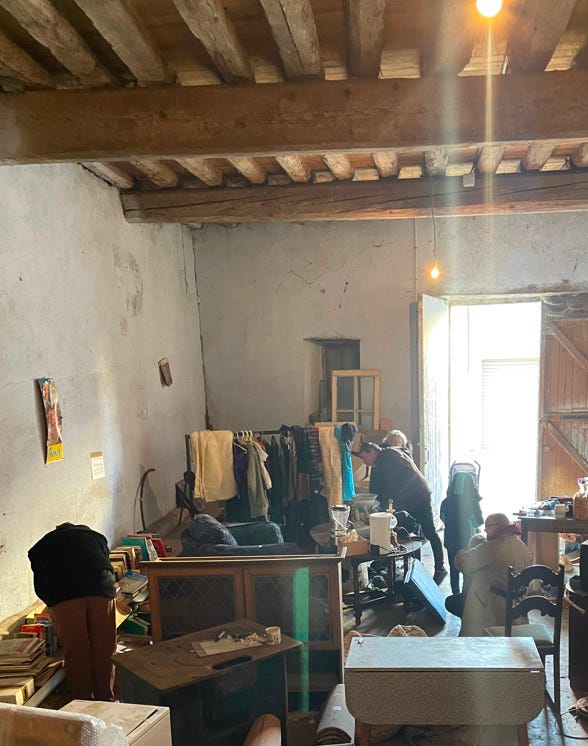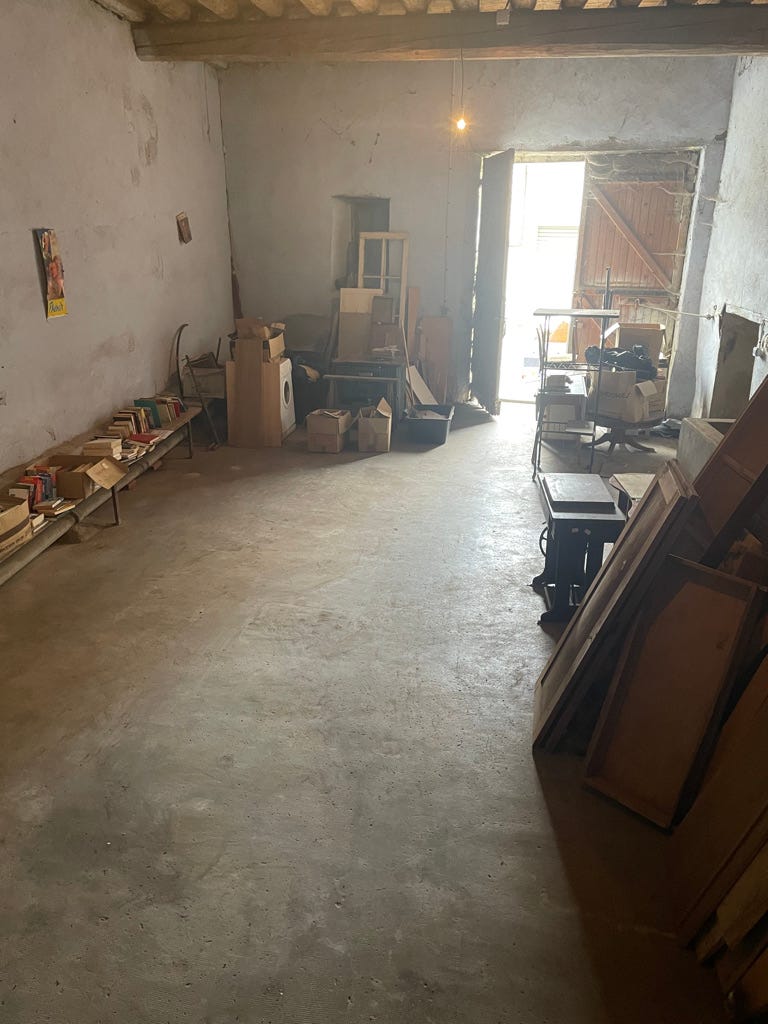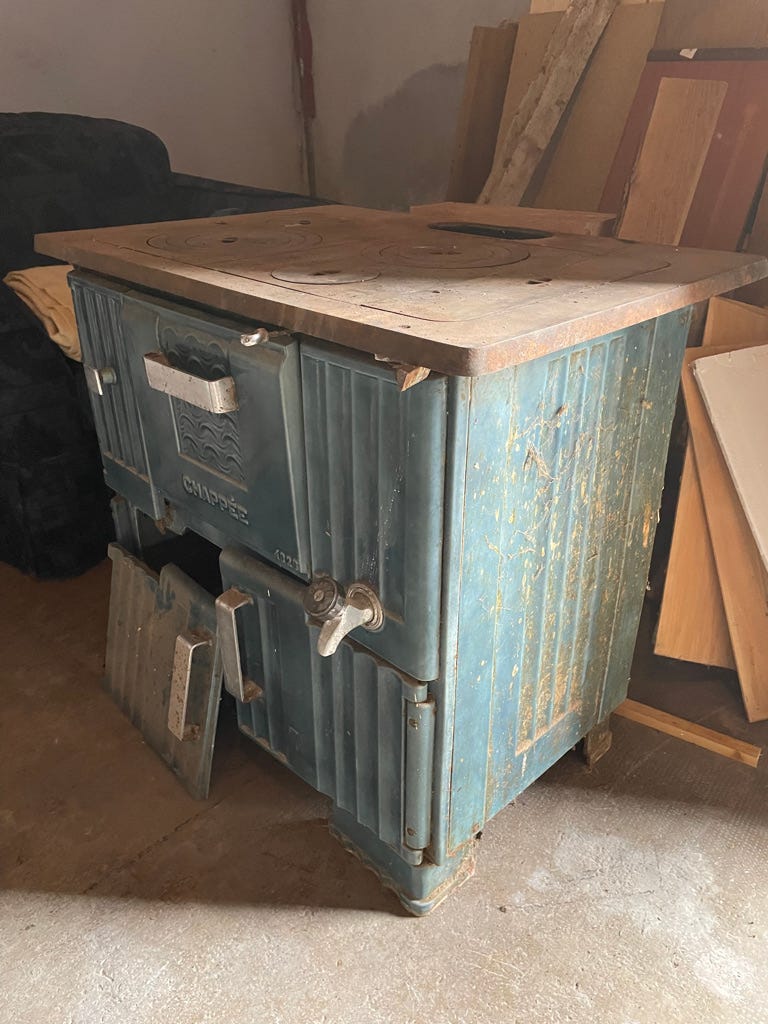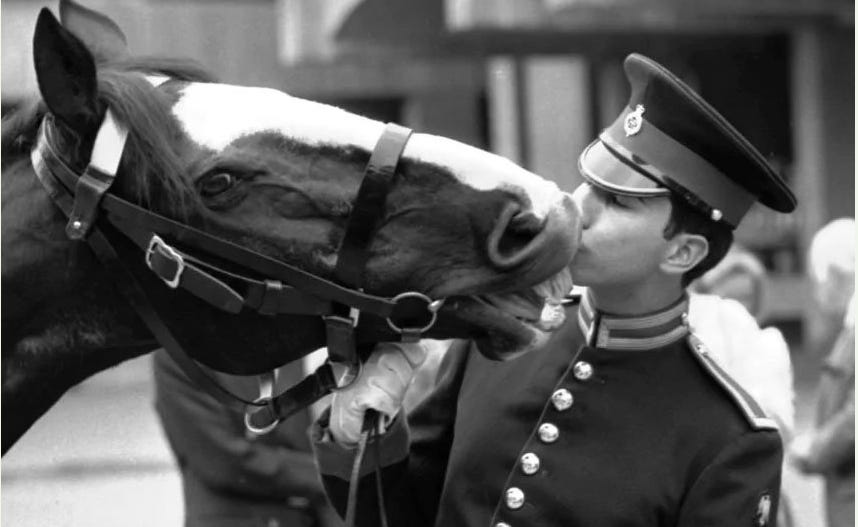I have spent a month in the south of France. I was cold for the whole month. The sun shone, sometimes, and sometimes the air was warm. But my large house is currently mostly unheated and the air inside was never warmer than outside. It is 300 square metres, the central heating broke years ago, I don’t want an oil-based heating system any more and am still figuring out how to best heat such a huge house (no, a heat pump won’t do it). So for now I have one inadequate wood burner in the living room, a couple of blower heaters and two electric blankets. Did this stop me swimming in a cold lake with excellent women? No. But they all got to go home to beautifully warm houses, and I got to go back to my kitchen and sit with the blower on and stick my face in it.
I was in France to sell half my house. Those three hundred square metres are attached to another three hundred square metres of garage and barn, and I’ve finally realised I don’t want it any more. When I bought the house in 2008, I was living in London in a flat and had no storage space. At the same time my parents moved to a smaller house when my stepfather was diagnosed with dementia. In short, I took all my life in boxes and shipped it down to France in half a container. This month I had to triage all those boxes: bin, tip, sell or keep. It was instructive. I kept about two schoolbooks, even while I marvelled at how much I knew when I was 15 and what different things I know now, and wondering which are more useful. Probably the O-level chemistry. I kept a couple of folders from Oxford and none from my masters degree at the University of Pennsylvania, as I’d switched from modern languages to international relations and realised after a month it was a right old load of jargon and shite. I then switched to comparative politics and didn’t much like that either. I have little patience for academic codification: that you have to cite this and that and in this or that order. One of my essays was judged by Professor Kratochwil to be “vividly written but lacking substance.” I think he thought that was an insult. Anyway. Bin.
I found some treasures: a photograph of my father that I thought I had lost. A beautiful cashmere scarf that I also thought I had lost. I missed both these things and both of them were sitting in a garage untouched for fifteen years. The scarf was in a box marked “scarves.” I had also an accumulation of furniture from the old cafe and restaurant (as the house used to be); and remnants that my friends left behind when they moved to Spain, I still can’t remember why (not why they moved to Spain but why they left me a washing machine). I had so much STUFF.
So I had an Vide-Grange/Empty-Garage sale. Vide-greniers — empty-attics — are common in summer in France. Mine was in cold January, but people still turned up. There’s not a lot of competition for things to do on a Saturday in winter in deepest rural France. Unless you think killing boar is a fun thing to do.
The older French people reminisced about the garage because it used to be the dance hall before the salle de fêtes was built. “They put a turntable over there in the corner and we danced.” It was also a cinema and the hole in the hole in the wall for the projector is still there. Plus it was the Vichy-supporting café; the Resistance-supporting café was up the street. But ten days of sorting through my own history left me somewhat numb to nostalgia. Oh, I said. Yes, how nice. Now do you want to buy one of these six tables or a washing machine?
I didn’t sell much. Some farm implements. A toaster. Some bric a brac. Sometimes at the dechetterie, which is run by a dreamy woman called Natalie who really needs to have her own reality show (dreamy as in vague, not dreamy as in drop-dead gorgeous), people wanted things I no longer wanted. One man peered into the trailer filled with my dechets and said, can I have that sewing machine? He was delighted. My grandmother was a seamstress and I have at least three sewing machines. I was also delighted. Another time I was carrying a strange wooden thing to the wood bin. I’d just cleaned out the first floor of the barn which was all pre-me left-behinds. A man ran after me. He actually ran. “Can I have that?” I said yes, but what is it? He said it was to roll the hay. “Are you going to roll some hay?” No, he said, I’ll put it in my gite as decoration. He stroked it with love. I bet he can’t resist some rolling.
Fill your boots, monsieur.
I usually get depressed at tips. But I was so sick of mountains of stuff that I hardened. Even so, it was a wrench to throw all my reporting notebooks into the bay. All those places, all those people. Iraq, Syria, Afghanistan, Bhutan, Liberia, Ivory Coast, Nepal, Japan, China.
But when am I going to read them again? Gone.
Pretty much the only thing I kept in abundance were letters. Boxes and boxes of them. Someone asked me yesterday why I had so many letters. “Because people used to write them.” Oh, and books. I cannot throw books into a waste disposal facility. I just can’t.
So the barn is in the process of being sold — I found a buyer in 24 hours because in small villages no-one prizes houses, they prize land and storage and neither come up for sale very often — and it is mostly empty and I have no regrets. But I do still have a lot of books.
And a beautiful cast-iron range that weighs an actual ton. Interested? Apply below.
Animal hero of the week : Sefton
You all know the story of Sefton. In 1982 the IRA blew him up, along with many other horses and people.
It was a Tuesday morning when a blue Morris Marina exploded. The car had contained a nail bomb composed of 11kg of gelignite and 14kg of nails. It was probably remotely detonated and timed to explode when the Cavalry was passing. As truly revolting nail bombs go, it was successful.
That was at 10.43. At 12.55, another bomb exploded underneath a bandstand in Regent’s Park. Six bandsmen were killed instantly and one died later.
Eleven people died in all; seven horses were killed. Sefton was doing his job in the Household Cavalry Mounted Regiment. But he had not always been an army horse. Or, he had not always been an ideal army horse. In his early career, after he had been shipped over from Ireland, he was noted to be very good at “breaking ranks, fidgeting and napping.” His nickname was “Sharky” because he was so fond of biting.
Even so, he managed to “pass out” in 1969 and got his regimental number marked on his hooves. This seems unfair: why don’t human soldiers get their numbers tattooed on their ears?
Because Sefton was, er, slow to obey commands, he was tipped out of the military and worked instead in the hunt, “with a bold jump and a fast pace”. Then he competed for the army as a showjumper for a while. On Tuesday morning, 20 July, 1982, Sefton and sixteen other horses were on their way for the Changing of the Guard. All were injured. All were punctured with nails. Seven were so badly injured they were shot.
Cedric, Epaulette, Falcon, Rochester, Waterford, Yeastvite and Zara.
Roy Bright, Dennis Daly, Simon Tipper, Jeffrey Young, Graham Barker, John Heritage, Robert Livingstone, George Mesure, John McKnight, Keith John Powell and Laurence Smith.
Sefton had a terrible neck wound. His handler tried to take off his shirt to staunch the wound but the man’s hand had a nail sticking out of it and he couldn’t get his shirt off. Sefton was in surgery for eight hours. His recovery involved masses of donations of mints as well as enough money to get a ward named after him at the Royal Veterinary College. He recovered and survived until 1993. There is no record of how many mints he was given.
What I like about Sefton, apart from the fact that the same horse who was declared Horse of the Year was kicked out of the army for wilful napping, is that he is the reason I now know there is a Home of Rest for Horses.











I hope you record a your slice of history of the 15 years of your significant property in the village, for prosperity. It sounds central to so much village life. Can completely understand why you'd want to simplify how much of it you own though, to your own needs. Still want a lego Maersk container ship? LMK your next visit to France!
Oh Rose, how I love reading your ramblings. Yes, Natalie at the tip is quite the thing. So different to the burly chaps here. Write more!!!